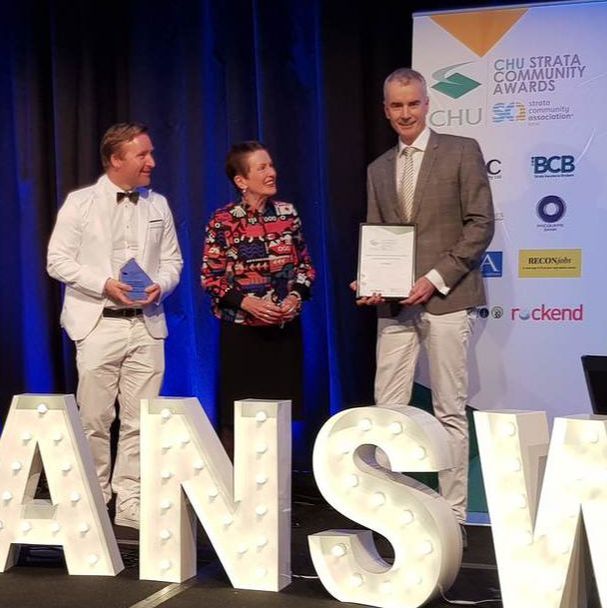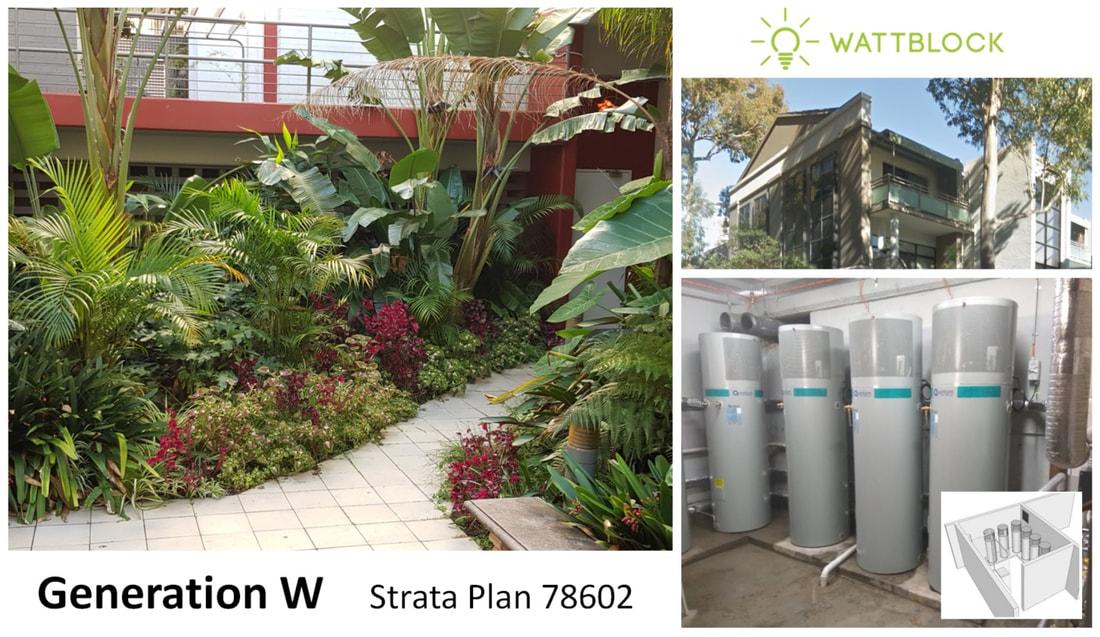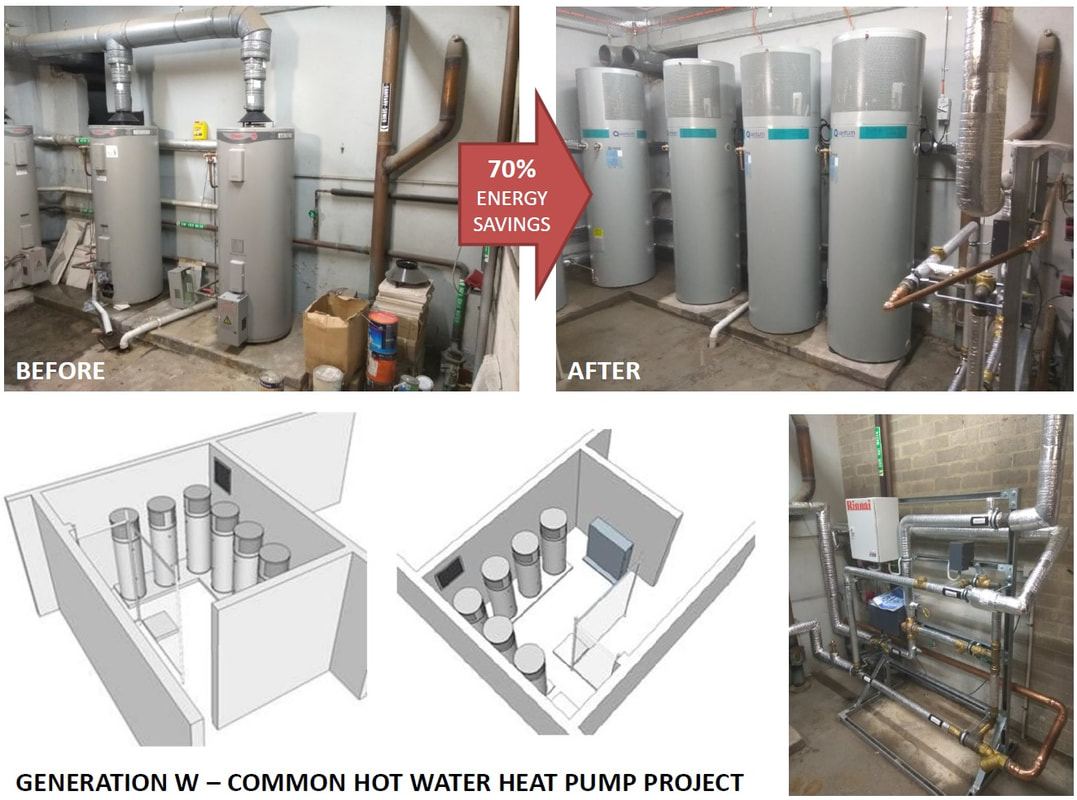|
Sponsored by City of Sydney and presented by Lord Mayor Clover Moore, "Generation W" took home the Strata Community Environmental and Engagement Award.
Wattblock director Ross McIntyre commented that the strata committee will be thrilled to received the award. Ross noted that Generation W had gone above and beyond LED lighting to also look at heat pump technology. Committee members Tim Cunningham and Chris Nunn were instrumental in pushing this project through. The finalists for the award included: Generation W: Once a commercial store house the development has been re-purposed and refurbished for residential usage in Woolloomooloo. The strata scheme has completed LED lighting, central hot water heat pump, vegetable and herb gardens and a worm farm! This is what it takes to achieve a 5-star NABERS rating. The Watertower: Approved by Clover Moore herself for redevelopment into residential apartments in 1984. The strata committee has been working through hot water and LED lighting projects. Summit Apartments: Large scale redevelopment on George Street Sydney approved in 2014 which committed to achieving an environmental performance standard for the building tower above the minimum requirements. Bauhaus Apartments: One of the first participants in the City of Sydney Smart Green Apartments program under Chairman Gordon Streight. Bauhaus has now established a recycle depot in a re-purposed car space. Generation W Overview (SP78602) Importantly the strata committee at Generation W have implemented a new heat pump system for the central hot water supply to the apartments. Heat pump technology has advanced significantly in the last few years and has been able to deliver energy savings of 70% for the residents. Heat pumps work on the principle of heat exchange, similar to the way a refrigerator works, only in reverse. Generation W Sustainability Goals Generation W is a low-rise residential strata scheme. Once a commercial store house the development has been re-purposed and refurbished for residential usage. The strata scheme now consists of 35 units with 3 residential floors and 140 square meters of roof space. The strata scheme has an active Owners Corporation that seeks to carry forward the principles of re-use, sustainability and community. The committee rallies the other owners in the pursuit of innovative solutions in the efficient and responsible use of resources including energy, waste and food. The OC initiated a sustainability plan and has acted on the recommendations with enthusiasm to see it through. Sustainability Initiatives Generation W obtained a ratings and assessment grant from the City of Sydney to investigate carbon abatement opportunities. Conducted by Wattblock the report identified a number of projects to pursue further. The common hot water system for the apartments has now been upgraded to a heat pump system. Solar thermal hot water solutions were also investigated. In the case of Generation W the heat pump technology demonstrated the greatest savings potential. The central location of the existing water boilers in the basement car park was ideally suited to a heat pump implementation. Generation W was able to take advantage of existing piping infrastructure and the existing location of the boilers was sound proof and well ventilated for efficient operation. This is very typical for strata schemes. Heat pump technology is often overlooked, so this project serves as a useful demonstration for other strata schemes. Generation W have entertained several visitors with an interest in this technology. The committee also followed through with an LED lighting upgrade in common areas including basement carpark, fire escapes, stairwells, corridors, and external lights. Dimmable enlighten Chamaeleon lights were used where appropriate to maximize the savings impact. Solar PV, smart meters and batteries have also been investigated with various solutions explored. The current Solar PV proposal involves development of unused roof space for 12kW of Solar PV panels while allowing for a proposed communal BBQ in another area of the roof. Solar PV logically follows the energy efficiency projects already implemented at the site to achieve a ‘right sized’ solar PV system. In addition to energy efficiency, water and renewable energy projects, the committee has also established an extensive community vegetable and herb garden. This includes implementation of a new food waste composting system and a worm farm. The scheme already has recycling bins. Measurable Results in Sustainability Outcomes The common hot water heat pump project achieved the biggest impact with a net 70% reduction in energy usage for hot water. The prior gas hot water system was estimated to be using 429,103 MJ p.a. billed directly to apartments. The new electric heat pump solution is estimated to be using only 130,284 MJ p.a (36,190 kWh equivalent). Furthermore the heat pump solution has allowed load shifting away from peak periods further alleviating local energy demand on the grid. The LED lighting project reduced the overall common area energy consumption from 36,681kWh to 12,599 kWh, representing a 65% saving of 24,082kWh p.a. The main ground floor common area now hosts a thriving open air communal garden which is used for growing food including: Strawberries, Paw paw, Olives, Asparagus, Lemons, Sweet potatoes, Rhubarb, Parsley (both Asian and curly), Limes, Kaffir limes, Passion fruit, Beetroot, Egg plant, Pumpkin, Tomatoes, Rocket, Chillies, Jalapeños. There are also heaps of herbs including: Thyme, Oregano, Sage, Chives, Basil, Rosemary, and Bay leaves. Residents are able to place food waste in composting bins. This is supplied with worms from a small worm farm maintained by one resident to help break down the waste and develop the soil. Additional Benefits The use of the common area for a vegetable and herb garden has been a tremendous boost to community engagement. The garden serves a source of food, learning, waste recycling, and as a social outlet. This has broken down barriers and raised enthusiasm in the discussion of other projects including energy efficiency, water, waste, transport, and renewable energy projects. Strata committee meetings are enlivened by discussion around these various projects and are now better informed about the attitudes and feeling of owners and residents in the community. Financially owners are already benefitting from a 65% reduction in common area energy costs which is reducing the burden on strata levies and opening up the potential for more community projects. Residential hot water bills are also benefiting from a net 70% reduction in energy consumption. Residents are also benefiting from free organically grown food that is more nutritious and tastes better than supermarket produce. Major Challenges Overcome Implementing Solar PV has been the greatest challenge. While the site has good solar access with 140 square meters of roof space, there have been several complications to work through. The first complication was the realisation that energy efficiency initiatives should be implemented first to reduce the overall energy footprint. This proved to be good advice with the now dramatically reduced common area energy load. This avoided potential over investment. A second consideration has been whether or not solar PV should be implemented just for the reduced common area loads, or expanded to include apartment energy consumption. While apartment energy usage offers the opportunity to deploy a much larger solar energy system, the complications and costs did not stack up. The committee remains alert to new commercial solutions in this space. Another challenge has been competing use cases for the available rooftop area. Members in the community have put forward various proposals which have been considered. In particular there is strong support for the development of a rooftop BBQ area. This in itself is a complex proposal requiring engineering assessment and council approvals. Support for the rooftop BBQ project has grown since the community has implemented the vegetable garden. The residents an enthusiastic about having a BBQ area to share the new food source in an open community environment. Engaging Residents on Environmental Initiatives With all these projects the committee has worked to overcome the barriers through regular committee meetings, documenting the progress, engaging professionals, and distributing findings with the community via email. The vegetable garden setting often serves as an informal discussion forum. Because of this, residents make the extra effort to read reports and findings. We have also held more formal community gatherings to talk through the issues. This case study was provided by the strata committee at Generation W. Please contact Wattblock if you would like more information. Ross McIntyre Editor, Strata Energy News Strata managers can now register buildings in the City of Sydney and in Melbourne for a fully funded electric vehicle recharge assessment. Registrations for Brisbane have closed. However, if you're interested in learning more contact Wattblock on (02) 9977 1801. Read more about the program here. Comments are closed.
|
Strata Energy NewsReceive our newsletter updates by email. Categories
All
Archives
May 2024
|
Services |
Company |
|




 RSS Feed
RSS Feed